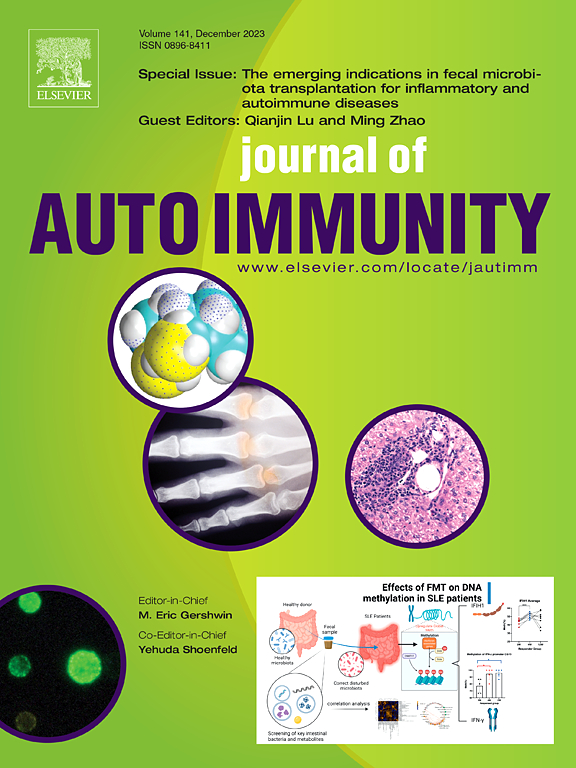原发性胆管炎中肝内CD69+CD103+组织驻留MAIT细胞的表型和功能特征
IF 7
1区 医学
Q1 IMMUNOLOGY
引用次数: 0
摘要
背景,粘膜相关不变性T细胞(MAIT)是一种先天样T细胞亚群,在原发性胆道胆管炎(PBC)的免疫病理中起重要作用。然而,我们对参与肝居住的亚群的理解尚未阐明。在这里,我们的目标是描述PBC中肝内组织驻留MAIT细胞的表型和功能特性。方法采集银组织和肝内单个核细胞,采用免疫组织化学、免疫荧光和流式细胞术进行分析。使用体外生成的组织驻留MAIT细胞来确定转录组。通过抑制剂治疗评估FOXM1的免疫调节作用,并通过CUT&;Tag-seq和荧光素酶检测证实BHLHE40的调节特性。结果在PBC中,肝内MAIT细胞频率降低,但组织驻留(CD69+CD103+) MAIT细胞显著扩增,表达明显的促炎表型,CXCR3、CXCR6表达显著升高;IL-17A, IFN-γ和T-bet。FOXM1是一种调控细胞增殖周期的转录因子,在组织驻留的MAIT细胞中的表达明显高于非驻留的MAIT细胞。FOXM1的抑制抑制了MAIT细胞的体外扩增,并损害了组织内MAIT细胞CXCR3、IL-17A、IFN-γ和GM-SCF的表达。CUT&;Tag-seq和荧光素酶检测显示FOXM1直接调控BHLHE40的表达。结论:我们的数据揭示了扩大的组织驻留MAIT细胞在PBC中的促炎作用是通过提高效应细胞因子、趋化因子受体和相关转录因子的表达介导的。FOXM1通过与BHLHE40的相互作用,对MAIT细胞增殖和组织驻留的促炎功能进行关键调控,并建立一个连接增殖和效应反应的转录轴。本文章由计算机程序翻译,如有差异,请以英文原文为准。

The phenotypic and functional characteristics of intrahepatic CD69+CD103+ tissue-resident MAIT cells in primary biliary cholangitis
Background & aims
Mucosal-associated invariant T (MAIT) cells are an innate-like T cell subset that plays a significant role in the immunopathology of primary biliary cholangitis (PBC). However, our understanding of the subpopulations involved in hepatic residency have not been elucidated. Herein, our goal was to delineate the phenotypic and functional properties of intrahepatic tissue-resident MAIT cells in PBC.
Methods
Liver tissue and intrahepatic mononuclear cells were collected and analyzed by immunohistochemistry, immunofluorescence and flow cytometry. The transcriptome was determined using in vitro generated tissue-resident MAIT cells. FOXM1's immunoregulatory role was evaluated with inhibitor treatment and regulatory features of BHLHE40 were confirmed by CUT&Tag-seq and luciferase assays.
Results
In PBC, the frequency of intrahepatic MAIT cell decreased, but tissue-resident (CD69+CD103+) MAIT cells significantly expanded and expressed a notably pro-inflammatory phenotype, with substantial elevated expression of CXCR3, CXCR6; IL-17A, IFN-γ and T-bet. FOXM1, a transcriptional factor governing cell proliferation cycle, exhibited notably higher expression in tissue-resident MAIT cells than in non-resident MAIT cells. Inhibition of FOXM1 compromised the in vitro expansion of MAIT cells, and impaired the expression of CXCR3, IL-17A, IFN-γ and GM-SCF by tissue-resident MAIT cells. CUT&Tag-seq and luciferase assay revealed a direct regulation of FOXM1 of BHLHE40 expression.
Conclusion
Our data reveals a pro-inflammatory role of expanded tissue-resident MAIT cells in PBC mediated via higher expression of effector cytokines, chemokine receptors and a related transcriptional factor. FOXM1 critically regulates MAIT cell proliferation and tissue-resident pro-inflammatory function, via interaction with BHLHE40, and establishes a transcriptional axis linking proliferation to effector responses.
求助全文
通过发布文献求助,成功后即可免费获取论文全文。
去求助
来源期刊

Journal of autoimmunity
医学-免疫学
CiteScore
27.90
自引率
1.60%
发文量
117
审稿时长
17 days
期刊介绍:
The Journal of Autoimmunity serves as the primary publication for research on various facets of autoimmunity. These include topics such as the mechanism of self-recognition, regulation of autoimmune responses, experimental autoimmune diseases, diagnostic tests for autoantibodies, as well as the epidemiology, pathophysiology, and treatment of autoimmune diseases. While the journal covers a wide range of subjects, it emphasizes papers exploring the genetic, molecular biology, and cellular aspects of the field.
The Journal of Translational Autoimmunity, on the other hand, is a subsidiary journal of the Journal of Autoimmunity. It focuses specifically on translating scientific discoveries in autoimmunity into clinical applications and practical solutions. By highlighting research that bridges the gap between basic science and clinical practice, the Journal of Translational Autoimmunity aims to advance the understanding and treatment of autoimmune diseases.
 求助内容:
求助内容: 应助结果提醒方式:
应助结果提醒方式:


